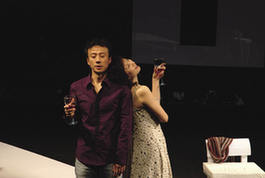An Eccentric Dramatist Who Focuses on Realities

L’Aide-Memoire, by renowned French playwright Jean Claude Carriere, had its Chinese premiere in October 2008, and was warmly received by local audiences. The Beijing People’s Art Theater, where the drama was staged, was filled to over 90 percent of its capacity. “That’s amazing. We didn’t expect much attention for such a serious play and small production,” remarks producer Wang Jingping.
L’Aide-Memoire debuted in Paris in 1968 and later won the Moliere Award, but its appearance in Beijing marks a break with typical local theater productions of recent years. Free of music and special effects, it unfolds in a starkly minimalist atmosphere, the metaphorical and metaphysical plot propelled only by dialogue between the two characters. “We attempted to include some commercial elements in the props and scenery, but the director said no. He wanted the production to remain as loyal to the original script as possible,” explains Wang.
The play is the first directorial effort of famed playwright Guo Shihang. “There are two reasons why I took on the directorial role: I love this play, and I wanted it to be staged intact with its essence interpreted by actors in a true and complete way. In this regard, I trusted no other directors.”
Guo first encountered L’Aide-Memoire in 2008, and was immediately engrossed by it. “This play is open and rich in uncertainties. It doesn’t make judgments, but offers sharp insights into human psychology by revealing the perplexity of two people in an abnormal relationship and their difficult choices.” Guo says his admiration for the play even provoked a sense of shame about his previous scripts.
L’Aide-Memoire opens one morning in bachelor Jean Jacques’ apartment. A young lady named Susan bursts in, looking for another man. Despite repeated protests from Jean, she scrounges around the space, and soon discovers a little black book that records his one-night stands with 134 women. Jean tries to get the intruder out before he leaves for the office, but Susan finds various excuses to stay, first for five minutes, then two hours, and eventually three days. Over this period an affection grows between them, but when Jacques makes up his mind to cast away his past and proposes to Susan, she leaves.
The story is set in the heat of the 1960s sexual liberation movement in Europe, and with his sexual liaisons with 134 women, Jacques is an avatar of the era. But Guo Shihang sees a real relevance for today’s China, and discerns profound social connotations behind the two characters’ bizarre romance.
“After mechanization swept family workshops away, and all-around craftsmen were replaced by workers fixed in particular spots on assembly lines, inter-personal relationships degraded into arrangements defined by capital. Many young men cannot afford to purchase homes, and have to live in rented apartments. They therefore lack the means to start families and have kids. Without marital bonds, they seek solace in sex with temporary partners. Many blame this phenomenon on the fickleness of human nature, without seeing the changes to the circumstance in which we live,” says Guo. “We Chinese might not have comprehended L’Aide-Memoire ten years ago, when the privatization of homes had barely started. Even if you had wanted to take a strange girl into your home in those days, it is unlikely you could have because of opposition from your father, who owned the house. One-night stands and the phenomenon of multiple sexual partners has appeared only in recent years.”
Guo has been known for his realistic work since his ‘idler’ trilogy – Fisher, Bird Keeper and Chess Fiend – of the 1990s. The characters in these plays squander much of their day fishing, breeding birds or playing chess. In seeking to stay above worldly matters, they end up enslaved by their hobbies, which are traditionally deemed the practices of hermits. “The dawdlers created by Guo Shihang’s pen wrestle with the burden of traditional culture. They are engrossed in China’s cultural heritage, but feel confused about its future,” remarks Zhou Fengli, a member of Theater Research Institute. “Though Guo portrays figures from the fringes of society, he probes the core of social ethics, and hence wins large audiences.”
Guo penned two more pungently realistic dramas in 2004 and 2007 – Public Toilet and Crematory. As the name suggests, Public Toilet is set in a public bathroom in a poor urban neighborhood. Across 30 years spanning the 1970s, 80s and 90s, the structure undergoes constant upgrading, eventually reaching a deluxe level reflecting China’s economic boom. The psyche of its users nevertheless sees little elevation, rambling from depression in the 1970s to confusion in the 80s and desolation in the 90s.
Crematory depicts the scene around someone’s last honors. The rite itself is not the focus, but rather the response of the participants. “The early arrivals start chatting, mostly on subjects irrelevant to the dead person. Their jabber and jest gives the occasion a festive air. When the ceremony starts, the guests wind in a line around the coffin. In the brief moment of solemnity, the sentiment that life is fleeting and should be well spent may flash through the mind of some mourners, but it is extinguished the moment they leave the parlor. Any noble thoughts give way to selfish instincts as they jostle for a seat on the bus,” sneers Guo Shihang.
“The memorial speech is also absurd. Flush with platitudes and compliments, it is nothing but a reminder of popular social norms, and the comments could apply to anyone. Traditionally Chinese believe the best they can do for the deceased is to provide them with a life of affluence and fun in the afterlife, which is actually the goal of the living. Arrangements for the funeral therefore expose people’s obsession with material comfort and their neglect of spiritual pursuits.”
|
